SmartKey
Important safety notes
 WARNING
WARNING
When leaving the vehicle, always remove the
SmartKey from the ignition lock. Always take
the SmartKey with you and lock the vehicle.
Do not leave children unsupervised in the
vehicle, even if they are secured in a child
restraint system, and do not give them access
to an unlocked vehicle. A child's unsupervised
access to a vehicle could result in an accident
and/or serious personal injury. They could:
- injure themselves on vehicle parts
- be seriously or fatally injured by extreme
heat or cold
- injure themselves or have an accident with
vehicle equipment that may still be in
operation even after the SmartKey has
been removed from the ignition, such as the
seat adjustment, steering wheel
adjustment or memory function.
If children open a door, they could cause severe or even fatal injury to other persons; if they get out of the vehicle, they could injure themselves when doing so or be seriously or even fatally injured by any passing traffic.
Do not expose the child restraint system to direct sunlight. The child restraint system's metal parts, for example, could become very hot, and a child could be burned on these parts.
 WARNING
WARNING
If a key ring is too heavy or too large, the
weight acting on the key could cause it to turn
in the ignition lock or catch on the steering
wheel. This could cause the engine to be
switched off suddenly. You could lose control
of the vehicle and cause an accident. Do not
attach any heavy or large key rings to the key
that is inserted in the ignition.
General notes
If you cannot lock or unlock the vehicle with the SmartKey, either the battery in the SmartKey is discharged, the SmartKey is faulty or the starter battery is discharged.
- Check the battery in the SmartKey and replace it if necessary.
- Unlock the driver's door using the mechanical key.
- Lock the vehicle using the mechanical key.
- Have the starter battery and the battery contacts checked at a qualified specialist workshop.
If the SmartKey is faulty, contact Roadside Assistance or a qualified specialist workshop.
SmartKey functions
General notes
 USA only:
USA only:
This device complies with Part 15 of the
FCC Rules. Operation is subject to the
following two conditions:
1. This device may not cause harmful
interference, and
2. this device must accept any interference
received, including interference that may
cause undesired operation.
Any unauthorized modification to this device could void the user’s authority to operate the equipment.
The Product label with FCC ID and IC certification number can be found in the battery case of the SmartKey.
 Canada only:
Canada only:
This device complies with RSS-210 of
Industry Canada. Operation is subject to
the following two conditions:
1. This device may not cause interference,
and
2. this device must accept any interference
received, including interference that may
cause undesired operation of the device.
Any unauthorized modification to this device could void the user’s authority to operate the equipment.
The Product label with FCC ID and IC certification number can be found in the battery case of the SmartKey.
Locking and unlocking centrally
The SmartKey centrally locks/unlocks:
- the doors
- the tailgate
- the fuel filler flap
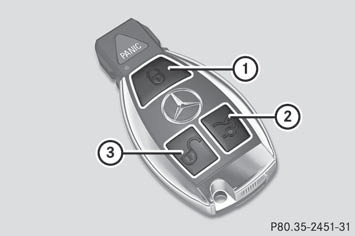
1  Locks the vehicle
Locks the vehicle
2  Opens/closes the tailgate
Opens/closes the tailgate
3  Unlocks the vehicle
Unlocks the vehicle
When unlocking, the turn signals flash once.
When locking, they flash three times.
When it is dark, the surround lighting also comes on if it is activated in the on-board computer.
You can also set an audible signal to confirm that the vehicle has been locked. The audible signal can be activated and deactivated using the on-board computer.
- To unlock centrally: press the 
button.
If you do not open the vehicle within approximately 40 seconds of unlocking: - the vehicle is locked again.
- the theft deterrent locking system is armed again.
- To lock centrally: press the 
button.
KEYLESS-GO
General notes
 USA only:
USA only:
This device complies with Part 15 of the
FCC Rules. Operation is subject to the
following two conditions:
1. This device may not cause harmful
interference, and
2. this device must accept any interference
received, including interference that may
cause undesired operation.
Any unauthorized modification to this device could void the user’s authority to operate the equipment.
The Product label with FCC ID and IC certification number can be found in the battery case of the SmartKey.
 Canada only:
Canada only:
This device complies with RSS-210 of
Industry Canada. Operation is subject to
the following two conditions:
1. This device may not cause harmful
interference, and
2. this device must accept any interference
received, including interference that may
cause undesired operation.
Any unauthorized modification to this device could void the user’s authority to operate the equipment.
The Product label with FCC ID and IC certification number can be found in the battery case of the SmartKey.
Important notes on the use of KEYLESS-GO
- The KEYLESS-GO key can be used like a conventional key.
- You can combine KEYLESS-GO functions with those of a conventional key, e.g.
unlock with KEYLESS-GO and lock with the
 button.
button.
- Always carry your KEYLESS-GO key on your
person.
- Do not keep the KEYLESS-GO key together
with:
- electronic devices, e.g. a mobile phone
or another key
- metallic objects, e.g. coins or metal foil.
This can affect the functionality of KEYLESS-GO.
- When locking and unlocking using KEYLESS-GO, the distance between the SmartKey and the corresponding door handle must not exceed 3 ft (1 m).
- If the KEYLESS-GO key is removed from the vehicle, it is possible that the system may not recognize the SmartKey. The vehicle can then not be locked or started using KEYLESS-GO.
- If the KEYLESS-GO key has been removed from the vehicle, e.g. if a passenger leaves the vehicle with a KEYLESS-GO key:
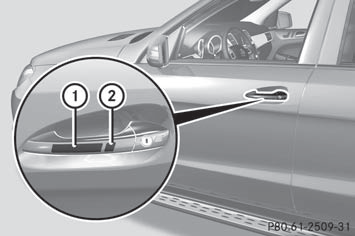
- To unlock the vehicle: touch the inner surface of the door handle.
- To lock the vehicle: touch sensor surface 1.
- Convenience closing feature: touch recessed sensor surface 2 for an extended period.
If you pull on the handle of the tailgate, only the cargo compartment of the vehicle is unlocked.
Changing the settings of the locking system
You can change the setting of the locking system in such a way that only the driver's door and the fuel filler flap are unlocked. This is useful if you frequently travel on your own.
- To change the setting: press and hold
down the  and
and
 buttons
buttons
simultaneously for approximately six
seconds until the battery check lamp
flashes twice.
 If the setting of the locking
If the setting of the locking
system is
changed within the signal range of the
vehicle, pressing the  or
or
 button
button
locks or unlocks the vehicle.
The SmartKey now functions as follows:
- To unlock the driver's door: press the
 button once.
button once.
- To unlock centrally: press the 
button twice.
- To lock centrally: press the 
button.
The KEYLESS-GO function is changed as
follows:
- To unlock the driver's door: touch the
inner surface of the door handle on the
driver's door.
- To unlock centrally: touch the inner surface of the door handle on the frontpassenger door or the rear door.
- To lock centrally: touch the outer sensor surface on one of the door handles.
Restoring the factory settings
- Press the  and
and
 buttons
buttons
simultaneously for approximately six
seconds until the battery check lamp
flashes twice.
Mechanical key
General notes
If the vehicle can no longer be unlocked with the SmartKey, use the mechanical key.
If you use the mechanical key to unlock and open the driver's door, the anti-theft alarm system will be triggered.
There are several ways to turn off the alarm:
- To turn the alarm off with the
SmartKey: press the  or
or
 button
button
on the SmartKey.
or
- Insert the SmartKey into the ignition lock.
or
- To deactivate the alarm with KEYLESS-GO:
press the Start/Stop button in the
ignition lock. The SmartKey must be in the
vehicle.
or
- Lock or unlock the vehicle using KEYLESS-GO.
The SmartKey must be outside the vehicle.
Removing the mechanical key
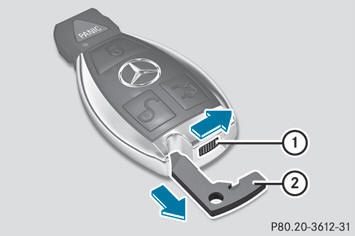
- Push release catch 1 in the direction of the arrow and at the same time, remove mechanical key 2 from the SmartKey.
SmartKey battery
Important safety notes
Have the batteries changed at a qualified specialist workshop.
 WARNING
WARNING
Batteries contain toxic substances.
Swallowing batteries can lead to serious health issues or death.
Keep batteries out of the reach of children.
Seek medical attention immediately if a battery is swallowed.
 WARNING
WARNING
The SmartKey batteries contain perchlorate
material, which may require special handling
and regard for the environment. Observe
government disposal guidelines. California
residents, see www.dtsc.ca.gov/HazardousWaste/Perchlorate/index.cfm.
Checking the battery
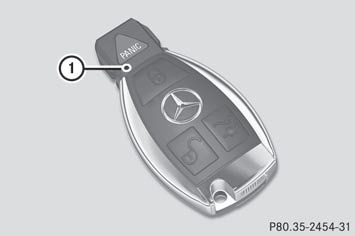
- Press the  or
or
 button.
button.
The battery is working properly if battery
check lamp 1 lights up briefly
If battery check lamp 1 does not light up
briefly during the test, the battery is
discharged.
- Changing the battery.
 You can obtain the battery at a
You can obtain the battery at a
qualified
specialist workshop.
 If the SmartKey battery is
If the SmartKey battery is
checked within
the signal reception range of the vehicle,
pressing the  or
or
 button locks or
button locks or
unlocks the vehicle.
Changing the battery
You require a CR 2025 3 V cell battery.
- Take the mechanical key out of the SmartKey.
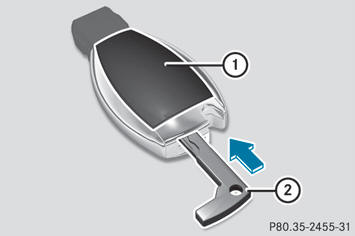
- Press mechanical key 2 into the opening in the SmartKey in the direction of the arrow until battery tray cover 1 opens.
When doing so, do not hold cover 1 shut.
- Remove battery tray cover 1.
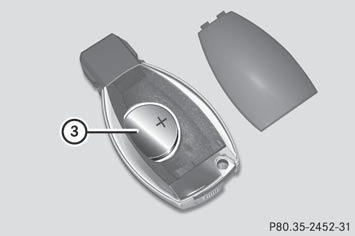
- Repeatedly tap the SmartKey against your palm until battery 3 falls out.
- Insert the new battery with the positive terminal facing upwards. Use a lint-free cloth to do so.
- Make sure that the surface of the battery is free from lint, grease and all other forms of contamination.
- Insert the front tabs of battery tray cover 1 and then press to close it.
- Insert the mechanical key into the SmartKey.
- Check the function of all SmartKey buttons on the vehicle.
Problems with the SmartKey
| Problem | Possible causes/consequences and
 Solutions Solutions |
| You cannot lock or unlock the vehicle using the SmartKey. | The SmartKey battery is discharged or nearly discharged.
- Try again to lock/unlock the vehicle using the remote control function
of the SmartKey. Point the tip of the SmartKey at the driver's door
handle from close range and press the
If this does not work: - Check the SmartKey battery and replace it if necessary. - Lock or unlock the vehicle using the mechanical key. |
| The SmartKey is faulty. - Lock or unlock the vehicle using the mechanical key. - Have the SmartKey checked at a qualified specialist workshop. |
|
| You can no longer lock or unlock the vehicle using KEYLESS-GO. | There is interference from a powerful source of radio waves.
- Lock/unlock the vehicle using the remote control function of
the SmartKey. Point the tip of the SmartKey at the driver's door
handle from close range and press the
|
| There is a malfunction with KEYLESS-GO.
- Lock/unlock the vehicle using the remote control function of
the SmartKey. Point the tip of the SmartKey at the driver's door
handle from close range and press the
- Have KEYLESS-GO checked at a qualified specialist workshop. If this does not work: - Check the SmartKey battery and replace it if necessary. - Lock or unlock the vehicle using the mechanical key. |
|
| You have lost a SmartKey. | - Have the SmartKey deactivated at a qualified specialist
workshop. - Report the loss immediately to the vehicle insurers. - If necessary, have the locks changed as well. |
| You have lost the mechanical key. | - Report the loss immediately to the vehicle insurers. - If necessary, have the locks changed as well. |
| The engine cannot be started using the SmartKey. | The on-board voltage is too low. - Switch off non-essential consumers, e.g. seat heating or interior lighting, and try to start the engine again. If this does not work: - Check the starter battery and charge it if necessary.
or
or |
| The engine cannot be started using KEYLESS-GO. The SmartKey is in the vehicle. |
A door is open. Therefore, the SmartKey cannot be detected as
easily. - Close the door and try to start the vehicle again. |
| There is interference from a powerful source of radio waves. - Start your vehicle with the SmartKey in the ignition lock. |
See also:
EBD (electronic brake force
distribution)
Observe the "Important safety notes"
section .
WARNING
If EBD has malfunctioned, the rear wheels can
still lock, e.g. under full braking. This
increases the risk of skidding and an acci ...
General notes
Mounting the emergency spare wheel is described under "Mounting a wheel"
.
You should regularly check the pressure of the emergency spare wheel,
particularly prior to long trips, ...
Protection of the environment
General notes
Environmental note
Daimler's declared policy is one of integrated
environmental protection.
The objectives are for the natural resources
that form the basis of our existence on th ...
